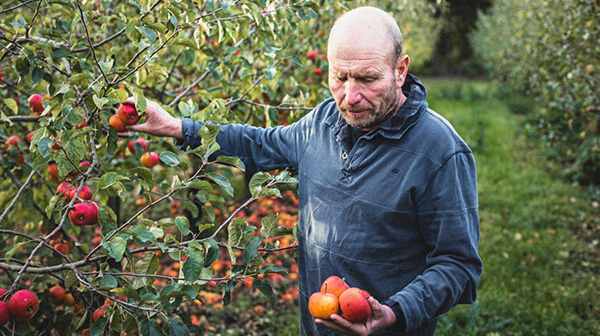An organic apple grower is donating land worth over a million pounds to a sustainable housing project with the aim of offering affordable homes to employees and secure the future of his business.
Paul Ward has given an acre of land at Mole End Farm with an equivalent value of over £1 million for a nominal £1 to the Crane Valley Land Trust, which has set out plans to build 15-20 zero-carbon houses for local people working and living in the area.
The houses will be built made from sustainable timber, efficiently insulated and powered by ground source heat pump systems, built in partnership with sustainable development charity Bioregional Homes.
One house has been set aside for a farm employee to buy, while two will be bought back by the farm at cost of production plus fees, to be sold to employees at an “affordable price”.
“If they choose to move on, the farm gets first refusal on buying them back. If they do wish to rent, we will rent them on purely break even rent at £450 a month. There’s very little take for the farm,” said Ward.
The farm is located outside the village of Cranbrook in the High Weald area of outstanding beauty in Kent, close to commuter town Tunbridge Wells and the busy traffic routes linking the Port of Dover, the Channel Tunnel and London.
Ward, who is the largest supplier of apples and pears to organic veg box company Riverford, said he is “filling a gap” in affordable housing “because no one else would do it”.
“This is one of the most expensive parts of the country. It’s in the Cranbrook School catchment area, which adds 10 per cent onto house prices, and it’s overspill for London as it’s only an hour away,” he said. “There is a huge amount of development going on here in all the villages. But there is no affordable housing here, absolutely none.”
“We need affordable housing. I don’t know how you solve the problem to be honest,” said Ward, who said the Brexit vote “spurred him on” in the housing project.
“We’ve got three couples who are the core team of our farm, out of a total 10-12 full time staff. Two are married and one are contemplating it, and they want to have kids. They’ve all got settled status,” he said, describing local house prices as “beyond affordability”.
An average two-bed terrace house in nearby Cranbrook costs £296,000, according to property website Right Move, while renting a two-bed house costs around £1,000 a month.
“We either have to retain these staff or train new people. They know our customer base. And it’s a very responsible job – we used computer models to predict pest outbreaks and we need people nearby to react quickly.”

The issue of labour in the fruit and veg industry has made headlines recently with reports of rotting fruit and apples left unpicked as growers face increased difficulty hiring enough pickers.
Ali Capper, chair of the NFU’s horticulture board, said: “It’s becoming the norm to subsidise accommodation. There are many instances of growers subsidising rent costs, providing free WiFi, covering fuel or meal costs.
“There are quite a lot of hidden subsidies and we wouldn’t attract the workers if we didn’t do that. If you want your core team to stay, you find ways to help them do that.
“You have to look at what we’re competing with. There is low unemployment in the UK and across Europe. That makes recruitment very difficult. Rural jobs where you work outside are a harder sell than in a factory undercover on the edge of a town.”
Labour shortages have been building for several years among the seasonal workforce, following the abolition of an official government scheme (SAWS) to allow worker in for the picking season.
This was compounded by the fall in value of the pound following the Brexit vote and the hostile atmosphere to immigrants since the referendum. Growers have been reporting shortages with increasing urgency, with warnings of a shortfall in pickers for the domestic crop at a time the UK potentially faces more expensive imports of fruit and veg if tariffs are put in place in the event of a no-deal Brexit.
The NFU estimates that the industry needs around 80,000 seasonal workers to cover the full season from the early daffodil and asparagus season right through to the winter veg, with around 13,000 vacancies left unfilled (19 per cent) in the 2018 season.
Eastern European workers make up the bulk of the industry’s workforce. “We need immigration everywhere. People are generally very positive, locally,” said Ward.
“When we advertised for a farm manager, she was by far the best candidate, head and shoulders above in terms of experience, which is why she got the job. She also wasn’t English. And we only had one applicant for the farm tractor operative job who was Romanian.”
Farms in expensive housing areas could be worse hit by shortages, said Ward, who highlighted Lincolnshire and Scotland as more affordable areas to live with equal opportunities for agricultural work.













0 Comments